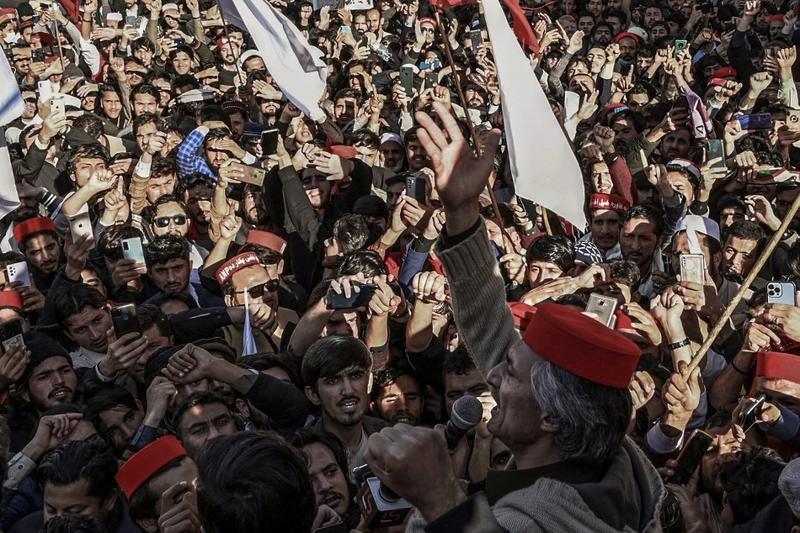 Activists of Awami National Party (ANP) gather during a peace rally following a mosque suicide blast inside police headquarters, in Peshawar on Feb 4, 2023. The continued threat of terrorism behind the Peshawar explosion in Pakistan on Jan 31 shows the impact of regional insecurity in the wake of the US-led NATO's long occupation but abrupt withdrawal from Afghanistan, experts say. (PHOTO / AFP)
Activists of Awami National Party (ANP) gather during a peace rally following a mosque suicide blast inside police headquarters, in Peshawar on Feb 4, 2023. The continued threat of terrorism behind the Peshawar explosion in Pakistan on Jan 31 shows the impact of regional insecurity in the wake of the US-led NATO's long occupation but abrupt withdrawal from Afghanistan, experts say. (PHOTO / AFP)
The continued threat of terrorism behind the Peshawar explosion in Pakistan on Jan 31 shows the impact of regional insecurity in the wake of the US-led NATO’s long occupation but abrupt withdrawal from Afghanistan, experts say.
However, they also believe the situation in Pakistan will improve with continuing efforts from Pakistan and support from other nations.
A powerful blast ripped through a crowded mosque in Peshawar on Jan 31, killing nearly 100 worshippers and wounding more than 200 others, mostly police officers and families, according to hospital and police officials
“Very unfortunate,” said Salman Bashir, a former Pakistani ambassador to China. “The explosion is another manifestation of the rise of terrorism in Pakistan.”
A powerful blast ripped through a crowded mosque in Peshawar on Jan 31, killing nearly 100 worshippers and wounding more than 200 others, mostly police officers and families, according to hospital and police officials.
Shakeel Ahmad Ramay, political economist and CEO of the Asian Institute of Eco-civilization Research and Development, said the premature and unprepared withdrawal from Afghanistan by the US and its allied forces has created a vacuum in regional security and anti-terrorism efforts.
ALSO READ: Blast derails train in southwest Pakistan, at least 8 injured
Some experts even believe the premature withdrawal was a calculated move by the United States, as they think the US wanted to create chaos in the region, with the prime targets being Pakistan and China, he noted.
“So, they (the US) hatched their interest groups in the region,” he said. “Now terrorists are also exploiting the situation to target Pakistan.”
Amina Khan, director of the Centre for Afghanistan, Middle East and Africa at the Institute of Strategic Studies Islamabad, said what happened in Peshawar is very unfortunate.
“However, this again unfortunately was expected, primarily because the Tehrik-e-Taliban Pakistan (TTP) had made it very clear (they had put an end to their agreed ceasefire with the government and) had declared a full-fledged war on the state of Pakistan,” she noted.
The Pakistani police had found a network of terrorists behind the deadly suicide bombing on a mosque in Peshawar city, in Khyber Pakhtunkhwa province, a senior police official said on Feb 2.
Khyber Pakhtunkhwa Police Chief Moazzam Jah Ansari said the Jamaat-ul-Ahrar faction of the banned TTP was behind the attack according to evidence collected by that time.
READ MORE: Death toll from Pakistan mosque blast rises to 100
The TTP claimed responsibility for the blast, but then they disowned it, he said. “It seems that they consulted among the group and realized that they will be criticized for attacking a mosque.”
Khan said she does believe that the abrupt US withdrawal has certainly led to a vacuum in fighting terrorism in the region.
According to her, the Taliban are “struggling” when it comes to the security of Afghanistan. She said the Taliban has to look after the security of the entire country as well as fight its own battle against ISKP – Islamic State Khorasan Province.
“Therefore, the US withdrawal indirectly but obviously has played a role in compromising the security of Afghanistan, and of the region as a whole,” she said.
Imtiaz Gul, executive director of the Center for Research and Security Studies in Pakistan, said this is a continuation of the proxy terrorism that Pakistan has been facing for at least 10 years.
The Peshawar bombing was the third-biggest attack in the city. Terrorists had hit the All Saints’ Church in September 2013; then in December 2014 the strike on the Army Public School left over 150 people dead.
“This basically means the proxy terrorists are attacking across the board,” he said, indiscriminately killing innocent people as well as security forces in order to create chaos and uncertainty.
“This obviously creates a great sense of insecurity in Pakistan … History also tells us that proxy terrorism has been an essential tool of geopolitics and this is what we see today around Pakistan and in Afghanistan.”
ALSO READ: Pakistan mosque bomber wore police uniform, breached security
Mustafa Hyder Sayed, executive director of the Islamabad-based think tank Pakistan-China Institute, said terrorism is “faceless, borderless and it has no religion, caste or creed”, adding that it is a threat to humanity and to civilization.
However, “Pakistan will combat and eliminate these terrorists who threaten the lives of civilians and Pakistan security forces because Pakistan, along with China in the China-Pakistan Economic Corridor, seeks to become a major economic power of Asia,” he said. “And if we want to do that, there is no room for insecurity and terrorism.”
Xinhua contributed to the story.


